In this chapter, we’ll explore how strengthening mental and emotional skills can help prevent gambling harm. We’ll look at ways to handle stress, control emotions, build resilience, resist peer pressure, and improve social skills—all of which can help you to make healthier choices and avoid the dangers of gambling.
a) Stress and How to Deal with It
Stress can hit us all—whether it’s school pressure, issues with friends, or family problems. For some, gambling might seem like a way to escape or cope. But there are better ways to handle stress!
How to Manage Stress:
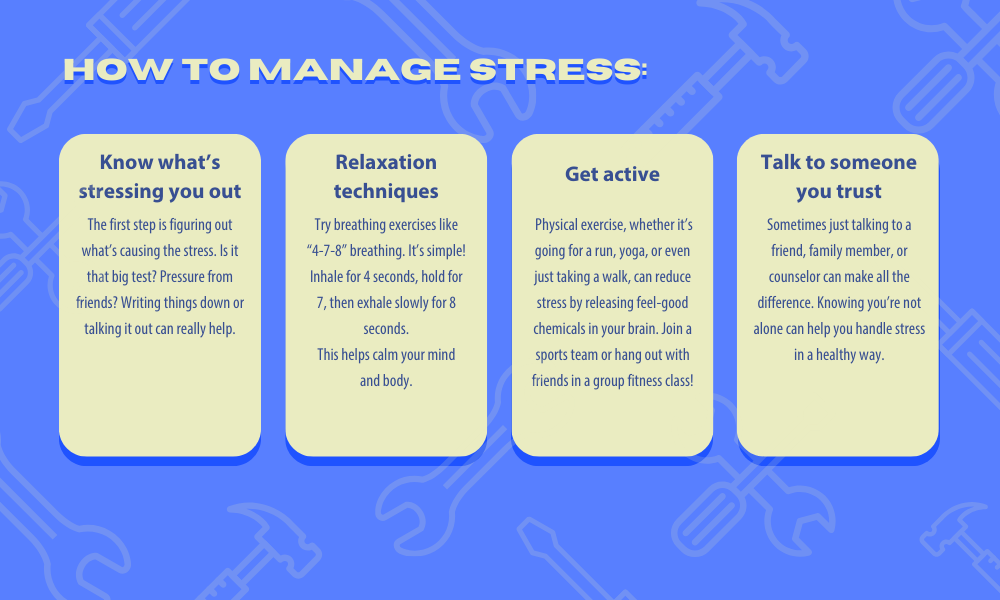
- Know What’s Stressing You Out: The first step is figuring out what’s causing the stress. Is it that big test? Pressure from friends? Writing things down or talking it out can really help.
- Relaxation Techniques: Try breathing exercises like “4-7-8” breathing. It’s simple! Inhale for 4 seconds, hold for 7, then exhale slowly for 8 seconds. This helps calm your mind and body.
- Get Active: Physical exercise, whether it’s going for a run, yoga, or even just taking a walk, can reduce stress by releasing feel-good chemicals in your brain. Join a sports team or hang out with friends in a group fitness class!
- Talk to Someone You Trust: Sometimes just talking to a friend, family member, or counselor can make all the difference. Knowing you’re not alone can help you handle stress in a healthy way.
Example in Action:
You could set up a personal ”Stress-Relief Routine.” Every Thursday, after school, take 20 minutes to either go for a walk, practice some deep breathing, or just write in a journal. This routine could help you manage stress without turning to unhealthy habits like gambling.
b) Understanding Emotions
Ever felt like you just want to escape your feelings? Whether it’s anxiety, loneliness, or frustration, sometimes it can feel easier to distract ourselves. Gambling might seem like a way out, but learning how to understand and manage our emotions is key to staying in control.
What are Basic and Complex Emotions?
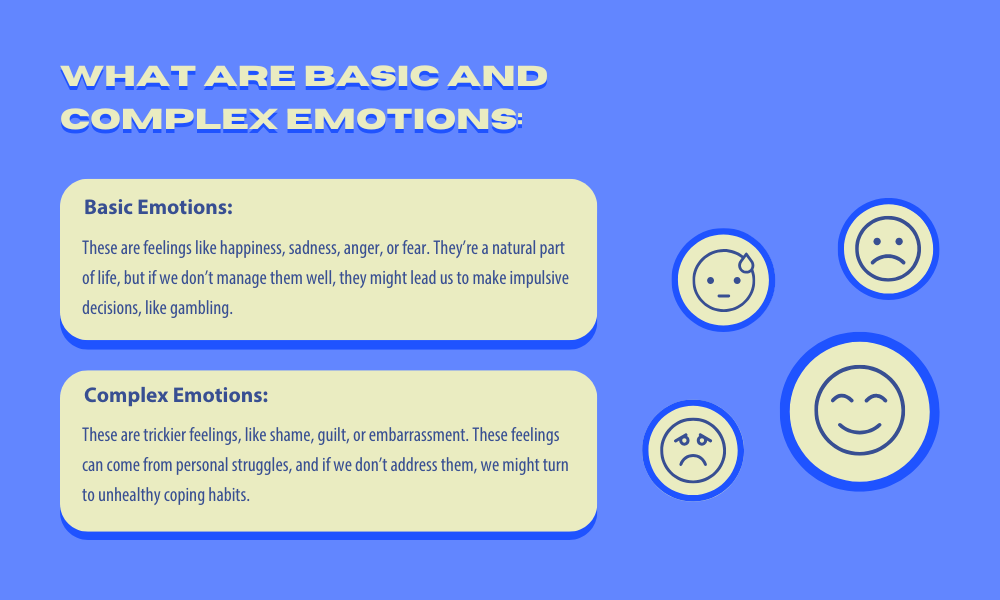
- Basic Emotions: These are feelings like happiness, sadness, anger, or fear. They’re a natural part of life, but if we don’t manage them well, they might lead us to make impulsive decisions, like gambling.
- Complex Emotions: These are trickier feelings, like shame, guilt, or embarrassment. These feelings can come from personal struggles, and if we don’t address them, we might turn to unhealthy coping habits.
How to Cope with Tough Emotions:
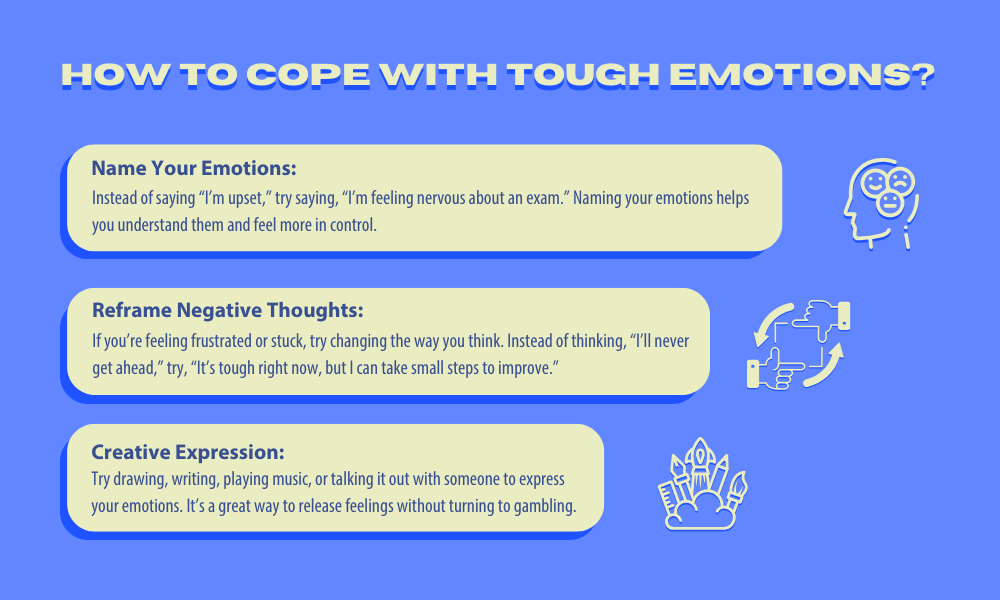
- Name Your Emotions: Instead of saying “I’m upset,” try saying, “I’m feeling nervous about an exam.” Naming your emotions helps you understand them and feel more in control.
- Reframe Negative Thoughts: If you’re feeling frustrated or stuck, try changing the way you think. Instead of thinking, “I’ll never get ahead,” try, “It’s tough right now, but I can take small steps to improve.”
- Creative Expression: Try drawing, writing, playing music, or talking it out with someone to express your emotions. It’s a great way to release feelings without turning to gambling.
Example in Action:
Create your own ”Feelings Journal.” Every week, take 10 minutes to write down or draw what you’re feeling. Over time, you’ll start to understand your emotions better, and it’ll help you find healthier ways to cope.
c) Building Resilience
Resilience is the ability to bounce back from setbacks. Life isn’t always easy, but being resilient means you can face challenges without giving up or turning to harmful habits like gambling.
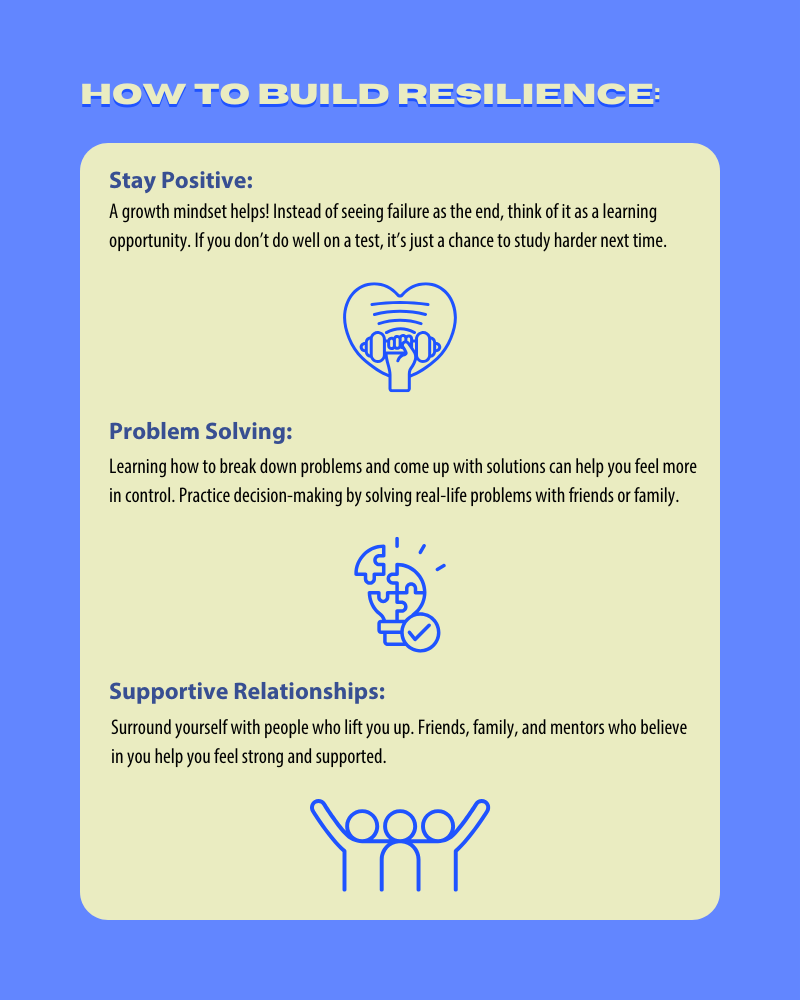
How to Build Resilience:
- Stay Positive: A growth mindset helps! Instead of seeing failure as the end, think of it as a learning opportunity. If you don’t do well on a test, it’s just a chance to study harder next time.
- Problem-Solving: Learning how to break down problems and come up with solutions can help you feel more in control. Practice decision-making by solving real-life problems with friends or family.
- Supportive Relationships: Surround yourself with people who lift you up. Friends, family, and mentors who believe in you help you feel strong and supported.
Example in Action:
Set a personal goal to work on your problem-solving skills. When something challenging comes up, instead of getting stuck or frustrated, take a step back, break it down into smaller steps, and think of one small solution you can try. This will build your confidence and help you stay resilient.
d) Handling Peer Pressure
Sometimes, friends or classmates might pressure you to try gambling, especially if it seems cool or normal in your group. But you have the power to say ”no” and make your own choices.
How to Handle Peer Pressure:
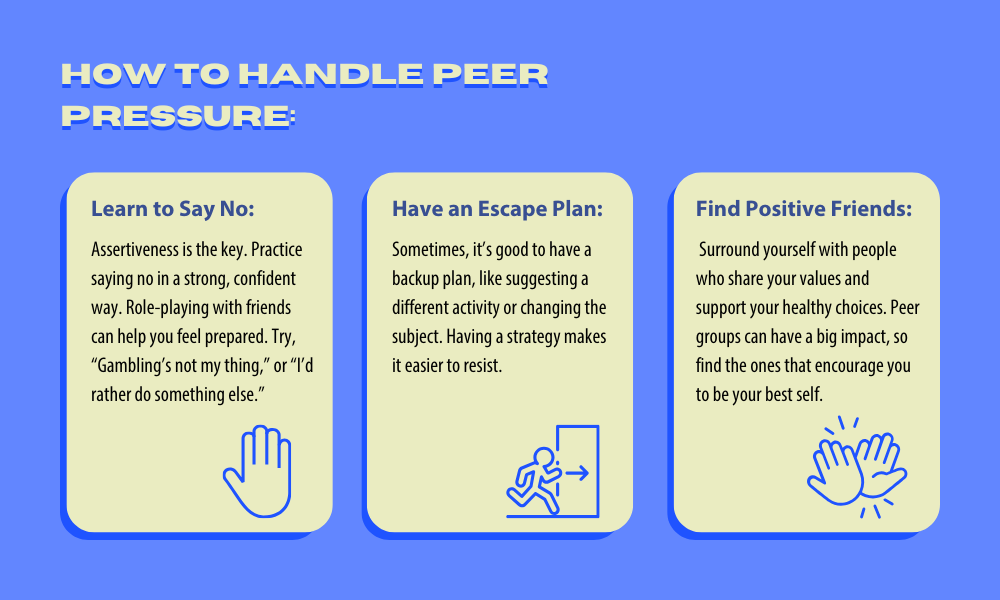
- Learn to Say No: Assertiveness is the key. Practice saying no in a strong, confident way. Role-playing with friends can help you feel prepared. Try, “Gambling’s not my thing,” or “I’d rather do something else.”
- Have an Escape Plan: Sometimes, it’s good to have a backup plan, like suggesting a different activity or changing the subject. Having a strategy makes it easier to resist.
- Find Positive Friends: Surround yourself with people who share your values and support your healthy choices. Peer groups can have a big impact, so find the ones that encourage you to be your best self.
Example in Action:
When you find yourself in a situation where friends are pressuring you, take a moment to pause. Practice saying something like, “I’m not into gambling, but I’d love to hang out with you and do [insert something fun here].” This will help you stay true to yourself without feeling awkward.
e) Social Skills and Handling Emotions with Others
Being able to understand and manage emotions—both in yourself and in others—is a superpower! When you learn how to handle emotions in social situations, you’re more likely to make better choices and avoid gambling.
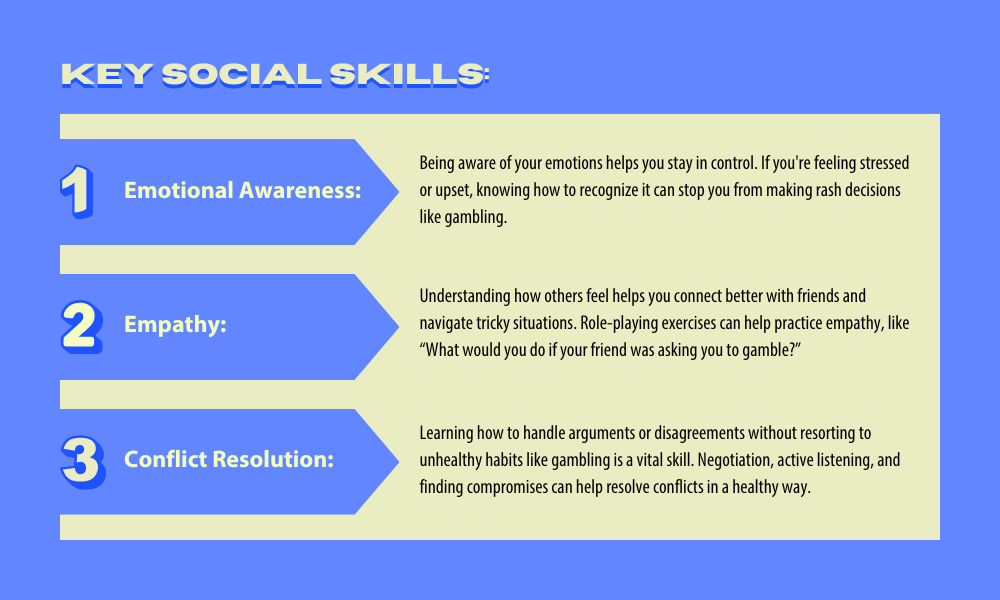
Key Social Skills:
- Emotional Awareness: Being aware of your emotions helps you stay in control. If you’re feeling stressed or upset, knowing how to recognize it can stop you from making rash decisions like gambling.
- Empathy: Understanding how others feel helps you connect better with friends and navigate tricky situations. Role-playing exercises can help practice empathy, like “What would you do if your friend was asking you to gamble?”
- Conflict Resolution: Learning how to handle arguments or disagreements without resorting to unhealthy habits like gambling is a vital skill. Negotiation, active listening, and finding compromises can help resolve conflicts in a healthy way.
Example in Action:
When you’re in a tough situation with a friend—maybe there’s a disagreement or your friend is pressuring you—take a moment to listen and understand their side. Then, try calmly expressing your feelings and finding a solution that works for both of you. This could be a simple conversation where you both agree on something positive, instead of letting the situation spiral into frustration or unhealthy behaviors like gambling.
Remember, You’ve Got This!
By building strong mental and emotional skills, you’ll be better prepared to face life’s challenges without relying on gambling. It’s all about staying in control and making healthy choices for your future!